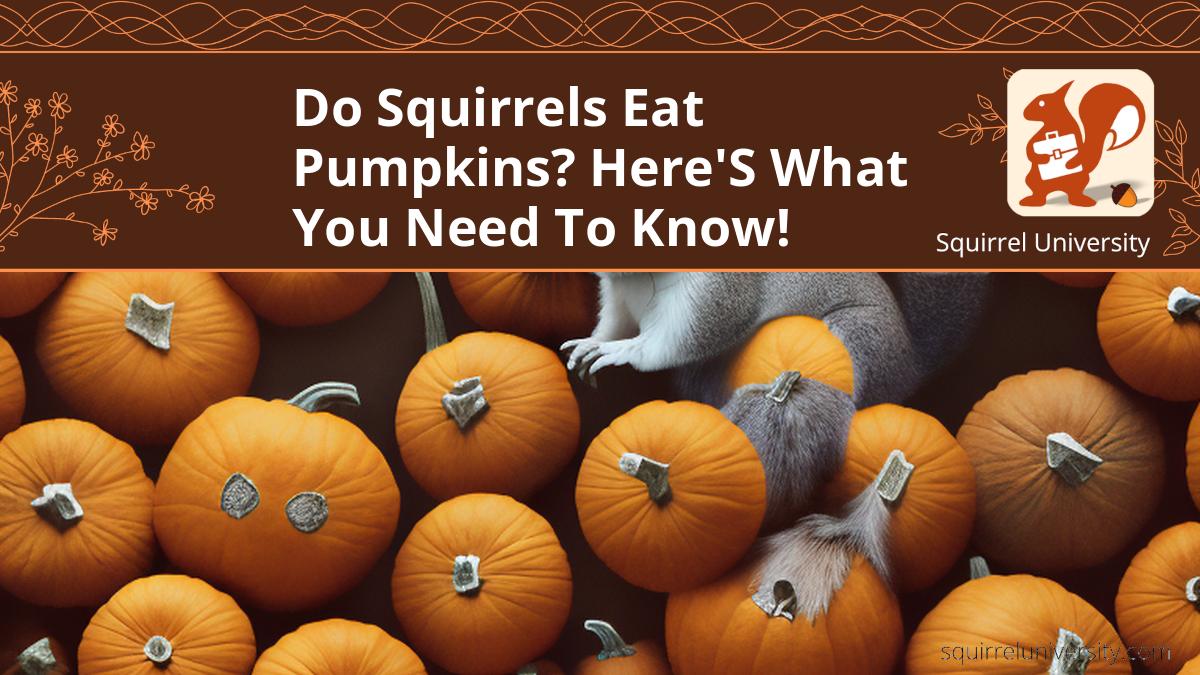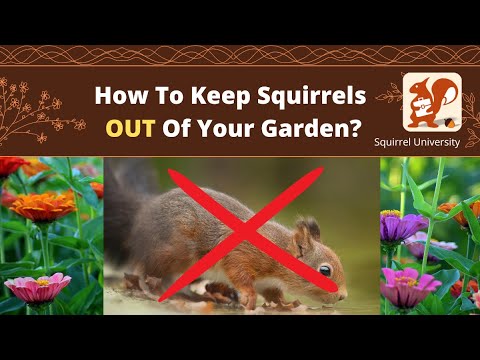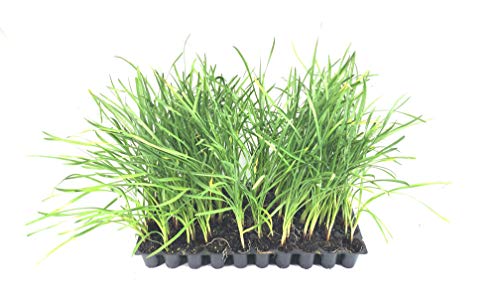As someone who has spent years observing and interacting with squirrels all over the globe, I can confidently tell you that the answer to your burning question: do squirrels eat pumpkins? YES! They absolutely love them. Pumpkins are filled with a variety of vitamins, minerals, and fibers that are essential for a healthy squirrel diet. Plus they’re very tasty! In this blog post, I’ll be sharing more information about what types of pumpkins squirrels prefer to eat and how much of it they should consume.
Do Squirrels Eat Pumpkins?
Squirrels are omnivores and will eat almost anything! Pumpkins can be a part of their regular diet. They consume both the fleshy part as well as the seeds, which provide a good source of fat and protein. In addition to this, squirrels may also nibble on pumpkin stalks and flowers.
Squirrels do eat pumpkins when they are available in their environment. They find them attractive due to their high nutritional value – especially with their sweet smell – so pumpkins can provide squirrels with an essential energy boost during those cold winter months when food sources can be hard to find.
However, it’s not recommended that you feed them large quantities of pumpkin as they don’t need it all year round; instead opt for smaller pieces occasionally throughout the colder months.
How to protect pumpkins from squirrels
Here are the best ways to keep squirrels out of your garden:
1. Physical Barriers
Squirrels are great climbers and jumpers, so adding a fence isn’t always enough. Consider using a wire cage around individual plants or placing netting over your entire garden to deter squirrels from entering.
2. Repellents
Repellents like hot pepper or predator urine can make your garden smell unpleasant to squirrels. You can also try planting herbs like rosemary and mint, which squirrels dislike.
3. Companion Planting
Companion planting involves interplanting crops to either attract beneficial insects or repel pests. Marigolds, garlic, and alliums are effective at repelling squirrels, so consider planting those alongside your produce.
4. Ultrasonic Deterrent Devices
Ultrasound technology can emit high-frequency noises that squirrels find unbearable, causing them to flee from your garden. Just make sure the device is placed close enough to the garden to be effective.
5. Motion-Activated Sprinklers
Set up motion-activated sprinklers to scare off squirrels with bursts of water. This also saves you from having to water your garden as frequently.
6. Remove Attractants
Make sure to clean up fallen fruits and seeds from your garden, as these attract squirrels. Use squirrel-proof bird feeders to prevent them from climbing up and stealing birdseed.
7. Decoy Predators
Place fake predators like owl statues or snake decoys throughout your garden to give squirrels the impression that predators are nearby. This can be particularly effective at night.
8. Feeding and watering squirrels
Providing squirrels with food and water can help deter them from digging up your garden in search of sustenance. Consider setting up a squirrel feeding station away from your garden.
9. Get a dog or cat
Dogs and cats are natural predators and will keep squirrels away from your garden. Just make sure to supervise their interactions to ensure your pets and squirrels stay safe.
10. Trapping
If all else fails, set up a humane trap to relocate squirrels to a different location. Make sure to check your local laws regarding trapping and relocating wildlife.
What Is a Pumpkin?
Pumpkins are an orange-colored squash belonging to the Cucurbitaceae family and are available in various shapes and sizes. They are a nutritious source of carbohydrates, vitamin A, beta-carotene, and dietary fiber. Pumpkins contain essential minerals like magnesium, manganese, zinc as well as protein and antioxidants.
They can be boiled or steamed to make soups or purees for pies, breads, muffins and custards. Pumpkins work great in savory dishes too; mashed pumpkin is the perfect accompaniment for roasted meats or vegetables.
Nutrition Information
- Carbohydrates: 4 grams per 1/2 cup (120 ml)
- Vitamin A: 6% of the RDI (recommended daily intake)
- Beta-Carotene: 7% of the RDI
- Dietary Fiber: 3.1 grams per 1/2 cup (120 ml)
Can Eating Pumpkins Be Healthy For Squirrels?
Yes! Eating pumpkins can actually offer some health benefits to squirrels including antibodies which help protect against common illnesses they may encounter in the wild such as parasites and diseases like leptospirosis.
Antibodies And Immunity Boosters
- Vitamin C: 10 %of the RDI
- Magnesium: 9 % of the RDI
- Manganese: 17 % ofthe RDI
Eye Health Benefits
Eating pumpkins may provide a host of eye health benefits for squirrels! The beta-carotene found in pumpkin is known to promote overall eye health and prevent diseases such as macular degeneration, night blindness, and cataracts. Additionally, the vitamin A content increases the production of melanin -a pigment that assists animals with their vision in dim light. Finally, pumpkin also contains zinc- an essential nutrient that supports healthy vision by providing antioxidant protection against toxins and free radicals.
What Parts of the Pumpkin Are Edible to Squirrels?
Pumpkins are a popular food source for squirrels. From the rind and flesh, to the seeds and brain – squirrels can eat many parts of the pumpkin with great ease.
- The vines, stems, and rind are all edible for squirrels if the pumpkin is still fresh.
- The flesh or “meat” of a pumpkin can be consumed by squirrels as long as it hasn’t been cooked or altered in any way. This part of a pumpkin is packed with nutrition, containing vitamins A and C, as well as various minerals such as magnesium, potassium and zinc.
- The seeds are also very nutritious for squirrels. They contain healthy fatty acids that provide energy and help improve digestion while supplying them with essential amino acids such as tryptophan – helpful for making serotonin in their brains which helps regulate mood swings in animals.
- The stem of a pumpkin can be eaten by squirrels which contains potent antioxidants that limit inflammation throughout its body while helping rid itself of toxins in its system over time.
Vines, Stems and Rind
Squirrels enjoy nibbling on vines, stems and rind of pumpkins. Vines are a favorite among squirrels as they are extremely sweet in taste and provide nutritional benefits. Stems are also great for providing nutrition. Lastly, the pumpkin rind is also an edible part of the pumpkin that many squirrels enjoy!
Seeds and the Brain
Squirrels can eat pumpkin seeds and they are loaded with nutrients. Not only do they provide a rich source of protein, but they also provide essential fatty acids that benefit their brain health. Pumpkin seeds contain high levels of antioxidants and vitamins like zinc which help with cognitive development and long-term memory retention.
Can Squirrels Eat Pumpkin Leaves?
Squirrels cannot directly consume entire raw pumpkins because they have an outer shell that is difficult to digest; however, they can safely eat other parts like leaves from mature pumpkins without hesitation when picked fresh off the vine! Pumpkin plants produce leaves that have varying nutritional benefits depending on their age but overall offer plenty of proteins along with vitamins A & C which help fight against common diseases in rodents often caused due to malnutrition. Additionally, these leaves contain dietary fiber which promotes digestive regularity – aiding in weight management within this species too!
How To Feed Pumpkins To Squirrels
Feeding pumpkins safely to small rodents requires more precaution than just offering them raw slices on a plate! In order to ensure that your furry friends don’t get sick from eating large chunks at once–or worse yet choking–it’s important to break down your serving into smaller pieces beforehand before offering it up as snacks around your garden or backyard habitat they call home! If you’re looking for an easier way to do so then consider making some tasty treats out of this versatile vegetable yourself.
Making Pumpkin Treats For Squirrels
Making homemade treats for your rodent visitors doesn’t have to be complicated either – especially since there’s plenty creativity involved here! Start by cutting out small cubes from whatever variety you’d like (acorn squash makes wonderful options too!) and boiling them until softened followed by mashing it together with peanut butter! You could also bake these ingredients into muffins or cookies afterwards if desired – whatever suits your preferences best really does wonders at having those hungry critters excitedly come running back when snack time rolls around again next week (just remember never give them raw slices though).
When Not to Feed Pumpkins To Squirrels
Although pumpkins can provide plenty of nutritional benefits for squirrels, there are certain precautions that should be taken when considering a pumpkin diet. First and foremost it is important to make sure the pumpkin isn’t rotten or moldy before feeding it to a squirrel. If the pumpkin has started to spoil, the smell will likely turn off even a hungry rodent and could potentially harm them in some cases.
It is also important not to offer pumpkins as food for baby squirrels. Their digestive systems are still developing and consuming too many carbohydrates or sugars can cause indigestion or other problems. Instead, they should stick with their mother’s milk until they’re weaned.
Finally, pumpkins should not be fed regularly to squirrels as part of their everyday diet. While it can provide some needed nutrition during certain times of the year, over-feeding them with sugar-rich foods such as this could lead to obesity and other health complications down the line. Offering occasional treats here and there is more than enough for them!
If It’s Rotten or Moldy
Squirrels may be tempted to eat pumpkins that are rotten or moldy. However, this can be dangerous for their health and should therefore always be avoided. If you find a pumpkin that looks wormy or has visible patches of mold on it, don’t offer it to your local squirrel population. Instead, discard the pumpkin so that no other animals fall ill after consuming it.
Never Give a Baby Squirrel Pumpkin
Squirrels should never be given pumpkins due to their high sugar content, which can lead to health problems. Instead, offer them a nutritious Mediterranean-style diet with plenty of nuts and seeds, as well as fruits and vegetables such as hot peppers or cayenne pepper. Additionally, farmers can use motion-sensor sprinklers or traps to keep squirrels away from crops.
Don’t Feed Them Every Day
Squirrels love pumpkins, but it’s important to remember not to feed them every day. Pumpkins are high in sugar and can cause health problems for squirrels if eaten in excess. Additionally, hot peppers and cayenne pepper may be used as a deterrent from eating pumpkins, while motion-sensor sprinklers or traps can be used to keep them away. A Mediterranean diet that is rich in nutrient-dense vegetables can help reduce the risk of developing chronic conditions over time. It’s essential to always provide squirrels with a balanced diet and avoid feeding them only pumpkin treats!
Conclusion
So, the answer to the question “Do squirrels eat pumpkins?” is yes, they do. In the wild, squirrels will often nibble on small pumpkin slices left behind by humans and can even enjoy a full-sized pumpkin if it’s been cut into wedges. However, it’s important to remember that pumpkins are not a regular part of their diet since they mostly consume nuts, fruits, and insects.
Therefore, while squirrels can certainly eat pumpkins as an occasional treat or snack food, their bodies are best nourished with a variety of other nutritionally rich foods. So if you want to feed your neighborhood squirrels some pumpkin goodness this fall season – go right ahead! Just be sure to consider all of their dietary needs when providing them with snacks.
You may also be interested in reading:















